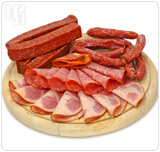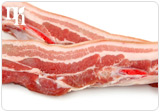
Vegetarians aside, meat is an important part of any person's diet. Eating meat can have both negative and positive effects on you and your hormones. Fluctuations of these hormones - estrogen, progesterone, and testosterone - is the cause of menopause symptoms, so it is important to find out what happens to each of these hormones when you eat meat. The following list will offer you an insight into the relationship between meat and your hormones.
Hormones and Meat
Estrogen
Although soy is touted as the best way to increase estrogen, meat also contains natural estrogens. Levels of estrogen are not as high in meat products as in soy products, such as tofu, but eating meat may help to increase estrogen levels.
However, meat is more useful in boosting testosterone levels; therefore, eating meat is more effective in relieving an estrogen dominance (by raising testosterone levels) than in boosting estrogen levels. When looking to significantly raise estrogen levels, consider choosing soy products or other phytoestrogenic foods.
Progesterone

Red meat is a great way to raise progesterone levels in the body. Zinc is one of the minerals found in food that promotes progesterone production, so the inclusion of more meat such as chicken and turkey is often recommended. However, eating too much meat can overload the body with hormones, leading to adverse side effects.
Testosterone
This hormone is stereotypically categorized as the “male hormone”, and this is widely due to the fact that it is linked to sexual desire and muscle growth. But menopausal women need testosterone for similar reasons: in order not to lose libido, to retain muscle mass and to avoid disorders like osteoporosis and depression.
Eating meat is a great way of raising your testosterone levels. The reason it raises testosterone is because meat contains lots of zinc and proteins, which promote the production of this hormone in the body. Bear in mind that eating too much meat means an increased intake of carbohydrates and fats, which can be ruinous for a healthy-eating plan, as well as the risk of overloading on testosterone.
More about Meat and Your Hormones
Food has a great say in how your hormones work. There are many menopausal symptoms, and to deal with them effectively you should consider making certain lifestyle changes. This is a brief overview of the relationship between hormones and meat. Click on the following link for more information about the link between your hormones and menopause.
